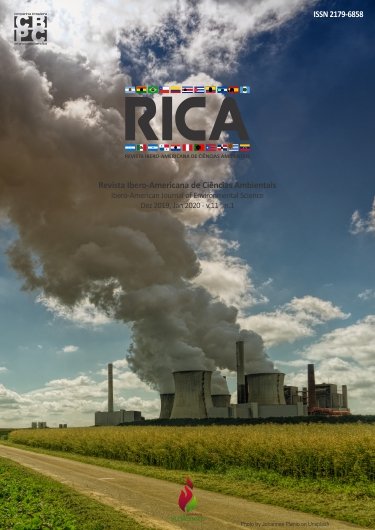Evaluation of water quality in places close to manure in rural properties producing milk in the Vale do Taquari/RS
DOI:
https://doi.org/10.6008/CBPC2179-6858.2020.001.0033Keywords:
Water parameters, Waste, Cattle farmingAbstract
Milk-producing properties can dispose of waste in three ways: properties without manure, properties with closed manure and without cover and properties with closed and covered manure. This work aimed to evaluate the water quality in places close to the manure on milk producing properties in Vale do Taquari/RS. Physical and chemical parameters were analyzed: pH, dissolved oxygen, total ammonia nitrogen, temperature, turbidity, true color, total dissolved solids and iron, and microbiological parameters: total coliforms, thermotolerants and Escherichia coli using the Standart methods methodology. A comparison was made of the points upstream and downstream to the manure, in addition to checking differences in the levels of these parameters in the hot (summer) and cold (winter) periods, January and June, respectively, in addition to comparing them to the levels established by CONAMA Resolution nº 357/2005 provides for the classification of water bodies and establishes the limits of physical, chemical and biological parameters. The results show that the analysis of the physical, chemical and microbiological parameters of the points upstream and downstream of the properties did not show significant statistical differences. In addition, the cold and hot periods (January and June) also do not change the levels of most parameters. The physical and chemical parameters: pH, temperature and thermotolerant coliforms had significant differences in the analyzed periods, with a decrease in their levels in the month of June. The parameters: dissolved oxygen, pH, total dissolved solids and total ammoniacal nitrogen are within the limits established by CONAMA Resolution No. 357/2005 for all classes. Iron levels are classified as class 3 for most samples. Iron and turbidity have samples with levels above the established for all classes. The color meets levels for class 2, whereas the microbiological parameters, thermotolerant coliforms and E. coli were within the established for classes 3 or 4 in most samples. It can be concluded that the water quality is compromised.
Downloads
Downloads
Published
Issue
Section
License
The CBPC - Companhia Brasileira de Produção Científica (Brazil CNPJ: 11.221.422/0001-03) the material rights of the published works. The rights relate to the publication of the work anywhere in the world, including rights to renewals, expansions and dissemination of the contribution, as well as other subsidiary rights. All electronically published works may subsequently be published in printed collections under the coordination of this company and / or its partners. The authors preserve the copyright, but are not allowed to publish the contribution in another medium, printed or digital, in Portuguese or in translation.









